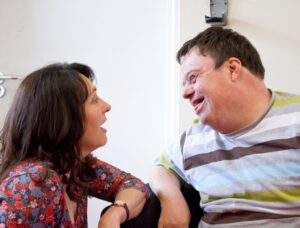A health watchdog has found that people with learning disabilities face “persistent and widespread” risks to their safety in hospital.
 The Health Services Safety Investigations Body (HSSIB) reviewed the care that people with learning disabilities receive and found that their safety is often compromised when they are admitted to hospitals in England.
The Health Services Safety Investigations Body (HSSIB) reviewed the care that people with learning disabilities receive and found that their safety is often compromised when they are admitted to hospitals in England.
The HSSIB said that hospital staff often lacked the right skills or support to effectively meet the needs of patients with learning disabilities.
Hospital failed to meet needs of patient with learning disabilities
 The review was prompted by the experiences of a 79-year-old man with a mild learning disability who died following a cardiac arrest two weeks after being admitted to hospital.
The review was prompted by the experiences of a 79-year-old man with a mild learning disability who died following a cardiac arrest two weeks after being admitted to hospital.
He struggled with speaking and hearing and was originally admitted with chest and skin infections. They heard that he became anxious when he was in hospital as staff struggled to communicate effectively with him. The issues were compounded by the fact that the sole specialist learning disability nurse employed by the hospital was on leave at the time of his stay.
The man refused care, including blood tests, during his two week stay in hospital. Eventually a blood text was successfully taken and it was discovered he was suffering with kidney failure, but he died from a cardiac arrest before those results were confirmed.
The HSSIB concluded that the hospital had failed to meet his needs sufficiently and they investigated the care provided at other settings for people with learning disabilities.
Lack of specialist staff to support people with learning disabilities
The watchdog identified a number of issues, including:
- Systems in place to share information about patients with learning disabilities were unreliable
- There was an inconsistency in the availability of specialist teams – known as learning disability liaison services – that support general staff in hospitals
- General staff did not receive sufficient training, although a national mandatory training programme is currently being rolled out across the NHS
Senior investigator Clare Crowley said that not having their needs met can result in “distress and confusion” for people with learning disabilities, their families and carers. She added that it also “raises the risk of poor health outcomes and, in the worst cases, harm.”
Meanwhile, Saffron Cordery, of NHS Providers, which represents hospitals, said services were committed to “stamping out” health inequalities experienced by patients with learning disabilities but that services needed investment in suitable training programmes and a more consistent approach to specialist support.
Training to support specialist needs
First Response Training (FRT) is a leading, national training provider.
 They deliver over 7,000 courses each year in the fields of health and safety, first aid, fire safety, food safety, mental health, health and social care and other special focus topics.
They deliver over 7,000 courses each year in the fields of health and safety, first aid, fire safety, food safety, mental health, health and social care and other special focus topics.
Their diverse portfolio includes training awards designed for care workers, such as Learning Disability Awareness, Understanding Autism, Oliver McGowan Mandatory Training, Positive Behaviour Support, Safeguarding Adults, Equality, Diversity and Inclusion, Person Centred Care and Support and many others.
Their course portfolio spans Care Certificate standards, mandatory training awards, clinical skills, special focus courses and training for supervisors and managers.
A trainer from FRT says:
“There are nearly one million adults living with a learning disability in England and they should be able to expect the same high quality, safe and dignified care as anybody else.
“Staff training can be vital to ensuring that care workers are able to communicate effectively with people with learning disabilities and provide compassionate, person centred support that meets their needs.
“We provide a range of training courses for learning disabilities and autism and can also deliver the Oliver McGowan Mandatory Training Framework on learning disabilities and autism, which enables NHS providers to meet the mandatory requirement for staff training.”
For more information on the training provided by FRT, please call them on freephone 0800 310 2300 or send an e-mail to info@firstresponsetraining.com.
